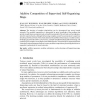Free Online Productivity Tools
i2Speak
i2Symbol
i2OCR
iTex2Img
iWeb2Print
iWeb2Shot
i2Type
iPdf2Split
iPdf2Merge
i2Bopomofo
i2Arabic
i2Style
i2Image
i2PDF
iLatex2Rtf
Sci2ools
123
click to vote
NPL
2002
2002
Additive Composition of Supervised Self Organizing Maps
The learning of complex relationships can be decomposed into several neural networks. The modular organization is determined by prior knowledge of the problem that permits to splitthe processing into tasks ofsmall dimensionality.The sub-tasks can be implemented with neural networks, although the learning examples cannot be used anymore to supervise directly each ofthe networks.This article addresses the problem of learning in a modular context, developing inparticularadditivecompositions. Asimple ruleallows de
Related Content
| Added | 22 Dec 2010 |
| Updated | 22 Dec 2010 |
| Type | Journal |
| Year | 2002 |
| Where | NPL |
| Authors | Jean-Luc Buessler, Jean-Philippe Urban, Julien Gresser |
Comments (0)

